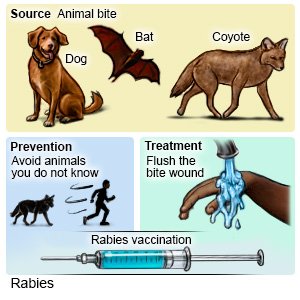Rabies
Medically reviewed by Drugs.com. Last updated on Aug 4, 2025.
AMBULATORY CARE:
Rabies
is a disease that affects the body's central nervous system (brain, spinal cord, and nerves). Rabies is caused by a virus. You may get the virus if you come into contact with the saliva or other tissue of an infected animal. Rabies infection usually happens through a bite wound. Animals that may spread rabies include dogs, cats, coyotes, raccoons, foxes, skunks, and bats. Rabies develops when the virus enters the skin and goes to the muscles or nerves. Without early treatment, rabies damages the brain and other organs. You may have brain swelling, seizures, and paralysis. Rabies can be life-threatening.
Early signs and symptoms:
Signs and symptoms of rabies may appear weeks, months, or even years after the infection. During the early stages of rabies, you may feel like you have the flu. You may have one or more of the following signs and symptoms for up to 10 days:
- Weakness, fever, headache, and irritability
- Loss of appetite, nausea, and vomiting
- Pain, numbness, or burning or tingling that may slowly spread to other areas
- Severe itching at the bite site
Late signs and symptoms:
Over time, rabies may affect the brain. Symptoms may include any of the following:
- Confusion or insomnia
- Dizziness, seeing double, or seeing something that is not really there
- Restlessness, anxiety, and hyperactivity increased by thirst, fear, light, or noise
- Seizures or twitching
- Slurred speech, drooling, swallowing problems, and a fear of water
- Tiredness, muscle cramps, or trouble moving
- Severe weakness that may be only on one side of the body or face
 |
Call your local emergency number (911 in the US) or have someone else call if:
- You have trouble swallowing or slurred speech.
- You have double vision, or you see things that are not really there.
- You begin twitching, have muscle cramps, or have a seizure.
Seek care immediately if:
- You think you were exposed to rabies.
- You were bitten by an animal. Clean the wound as soon after the bite as possible.
- You feel weak, tired, dizzy, confused, restless, or anxious.
Call your doctor if:
- You have a fever.
- Your signs and symptoms do not get better after treatment.
- You have questions or concerns about rabies and rabies treatment.
Treatment:
The main goal of treatment is to prevent the virus from spreading inside the body. Treatment as soon as possible may prevent more serious problems and increase recovery.
- You may need to get the rabies vaccine. The rabies vaccine helps your body make antibodies to fight the virus. You will be given 2 doses if you received at least 1 dose before. You will be given 4 doses over 2 weeks if you never received a dose. You may be given 5 doses if you never received a dose and you have a weak immune system.
- Rabies immune globulin (RIG) may be given. This medicine will attack the virus and help your immune system fight the infection. RIG is usually given on the day you receive the first vaccine dose, or soon after.
Prevent rabies:
- Ask your healthcare provider about the rabies vaccine. You may need the vaccine if your risk for rabies is increased through work or travel. You will be given 2 doses a week apart. You may need a booster dose within 3 years after the first 2 doses.
- Avoid contact with animals. Do not approach any wild animal, or any tame animal that you do not know. Cover windows and other openings in your home with screens so wild animals cannot get inside.
- Get medical care if you get bitten by an animal. Do this even if the wound is very small.
- Get your pet vaccinated against rabies. You will need to do this every 3 years or as directed by your veterinarian.
 |
If an animal that can carry rabies bites you:
- Clean the bite wound. Clean the bite wound for at least 5 minutes. Use soap and water, or povidone-iodine solution mixed with water. Do this right after you are bitten to lower the risks for a wound infection and rabies. Cover the wound with a clean bandage to prevent infection.
- Seek care right away. Healthcare providers may need to treat the wound and close it with stitches. You may need to take antibiotics to help fight or treat a bacterial infection. The rabies vaccine series may be started immediately.
Follow up with your doctor as directed:
Write down your questions so you remember to ask them during your visits.
© Copyright Merative 2025 Information is for End User's use only and may not be sold, redistributed or otherwise used for commercial purposes.
The above information is an educational aid only. It is not intended as medical advice for individual conditions or treatments. Talk to your doctor, nurse or pharmacist before following any medical regimen to see if it is safe and effective for you.
Learn more about Rabies
Treatment options
Care guides
Further information
Always consult your healthcare provider to ensure the information displayed on this page applies to your personal circumstances.
